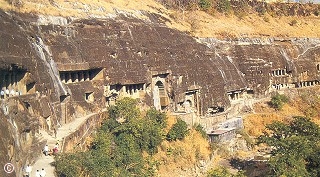iMahal Interview Series:
Robert Arnett
August 15, 2000
iMahal: Looking through your book, I must say that the photographs are amazing. Did you study photography or were you an amateur photographer before you published this book?
Arnett: I have always enjoyed photography and had an aesthetic eye for it but I never took a formal course in photography.
 |
 |
Fishing nets
Cochin, Kerala | Sunset
Kanyakumari, Tamil Nadu |
People often ask me why I don't take a course. I do believe in studying the sciences and the scientific side of things. However, I often give a flippant response to the question, saying that I don't want formal training in photography because I don't want to ruin my natural aesthetic sense for it, by letting other people impose their ideals on me.
iMahal: When did your interest in art begin, from your working as an art collector or was it your family's influence?
Arnett: I studied art in college, but my love for art has always been in me. I remember when I was 12 or so, I went with my mother to Atlanta, Georgia. I'm from Columbus, Georgia. My mother was going to the doctor's office in Atlanta and across from the doctor's office was the main museum in Atlanta. It was an Art Museum. I remember going into the museum alone and being so disappointed because it only had Western Art, and somehow that was not fulfilling for me.
iMahal: Since you were interested in other forms of art, did you travel overseas for such exposure?
Arnett: No. Not until I went to the London School of Economics in my junior year of college did I travel abroad, and later when I was in the military. After that my brother and I traveled extensively for our art collection business.
iMahal: We know you have done Oriental Art exhibitions. What about Indian Art?
Arnett: As a matter if fact, Indian Art was a focal point in the first major exhibit that my brother and I did. The exhibit, held in the southern US, was an effort to educate and change people's consciousness. Our "Beyond India" exhibit at the High Museum of Art in Atlanta, Georgia showed the influence that Indian philosophy, particularly Buddhism, has had on Southeast Asian cultures.
iMahal: You have visited India several times and have spent considerable time learning about India first-hand. What did you find most remarkable about India?
Arnett: Many things stands out about India. The first and foremost, for anyone who has ever gotten off the beaten tourist track and into Indian homes, would be the hospitality of Indians. In Indian culture a guest has the same status as god. I'm from Columbus, Georgia, and we pride ourselves in "Southern Hospitality." Although by and large people are nice everywhere, Indian hospitality makes Southern Hospitality seem like absolutely nothing.
iMahal: Is there something in particular that makes you feel this way? I know from my own experience that you can't leave an Indian's home without eating something.
Arnett: That is so true! In India they don't want to know what "bhus bhus" [Hindi for "no more, no more please"] means. I've learned to cover my plate with my upper body when the food comes around. On numerous occasions when I was traveling alone, people would talk to me and when they found out that I had a sincere interest in Indian culture, they would insist on my being their guest and staying with them because I would be lonely in a hotel. I would get so many such invitations just walking down the streets, from people I met in office buildings, while making travel reservations, etc. I found that very touching.
I remember one time in particular. I was on a train in Mumbai [Bombay] on my first trip to India. A very kind man sitting next to me gave me directions on how to change trains to get to my destination. Fearing that I may get lost, he actually got off the train with me to make sure I made the correct connections. He then gave me some sage advice. He said, "If you ask an Indian for directions, always ask a second Indian to make sure that the directions the first Indian gave you are correct. It's not because they will deliberately give you wrong directions; it's just that you have everyone wanting to help you, that you may get the wrong information." Indians will always go out of their way to help others. My problem was not getting information but it was making sure it was correct.
 |
Budhhist Caves at Ajanta
Ajanta, Maharashtra |
I remember another time in Victoria Station in Mumbai, also on my first trip to India, when I asked someone on which platform I could find the train for Jhalgon -- to go to Ajanta and Ellora Caves. The guy didn't know but he started shouting at the top of his lungs, "Does anyone know the platform for Jhalgon?". Someone did come by who did know and they made sure that I got to the proper place. Now can you imagine that happening in Grand Central Station in New York City?
iMahal: Isn't it wonderful that you were able to see India, not as a tourist but as a local, by staying with local families?
 |
"Preaching" Buddha
Ellora, Maharashtra |
Arnett: Yes, indeed! That's also how I was able to write the book, not based on how long I was in India or the sites I visited, but staying with such wonderful families. When I went to India for the first time, I knew only one person and had a contact for another family. During my first month, I stayed in a hotel for only about three days -- visiting Ajanta and Ellora - the tourist sites. The rest of the time, especially in Gujarat [a state in India], people were so friendly that they invited me to stay with them.
Now I have the same problem as typical Americas of Indian descent do when they go back to India. I now have too many invitations to visit people, demanding quite a juggling act since I want to travel around more. I have some families in India that I consider my own. In particular, one family in Indore [in the state of Madhya Pradesh] said that they wanted me to know that I meant a lot to them, and that if I ever needed a place to live, I could come live with this family. Isn't that just amazing! Although I know I can do that with my brother and his wife, he's never offered that.
iMahal: Have any of your close connections from India come here to visit?
Arnett: Not to visit, but the family I stayed with on my very first day in Mumbai has immigrated to the US. This was the family whose address was given to me as a contact for when I arrived in India. In the true Indian fashion, a woman in my meditation group in Atlanta gave me the name of her sister in India to call her when I got to India. She wrote to her sister and told her I would be coming and asked if she could help me out. When I reached Mumbai, I called her and they offered to come get me from the airport. I said no, I'll find my way there. They really got me on the right foot to start with. They showed me all around Mumbai, not so much the commercial places, but the ashrams [spiritual places for meditation], important temples, etc.
iMahal: What does India mean to you personally? What comes to mind, first and foremost, when you think of India?
| | |
... When I think of India, the first thing that comes to my mind is the tradition of hospitality ...
|
Arnett: When I think of India, the first thing that comes to my mind is the tradition of hospitality. I have noticed countless incidents of people helping others out. As I said earlier, throughout my trips to India people showed tremendous kindness towards to me.
 |
Woman saying "pranam"
[salute] to Sun
Benaras, Uttar Pradesh |
Another thing that comes to mind is the devotion -- first and foremost the devotion for God, the devotion to the temples, the devotion to live a life of dharma, and devotion for family. It is really quite touching. As a result of seeing the devotion that children have for their parents and other adults, and the adults for their children, one of the first things I did when I came back to the US was to move home with my mother. She was a widow and living alone at that time. I saw the example of what family life should be, what it is, and what it could be. It was one of the wisest decisions I have ever made in my entire life.
Here is something really touching that I saw at one of the youth camps. There was a counselor of high-school age who was telling a new youth that one of the kids can't sleep at night. The kid is raised in a family with his grandparents, and you know that they read their grandchildren a story at night or sing to them. So if you do those things for the child, he will go right to sleep. I thought that discussion was so beautiful, and it is missing in American life.
iMahal: Did you travel in India alone? Can you read, write, or understand any Indian languages?
Arnett: Not much, I speak and understand very little of any of the Indian languages. But everywhere I went someone spoke some English to help me.
| | |
... Western linguists agree that Sanskrit is the most perfect phoenetic language in the world, ...
|
Interestingly, I usually could distinguish between
Sanskrit and any of the other Indian languages or dialects. Often when
hearing Sanskrit prayers with their pleasing sound and meter, it would
evoke a tingling sensation within me, as if it was resonating in my inner
core. Western linguists agree that Sanskrit is the most perfect phoenetic
language in the world, so even if second generation Americans of Indian
descent don't know the meaning of what they are chanting in Sanskrit, if
they learn to chant properly it will have the effect of activating their
higher centers (chakras) of consciousness in their astral spine.
iMahal: There is a vast difference between the two cultures - that is, the American and the Indian culture. How were you able to bridge this chasm and get so intimately involved with the Indian culture?
Arnett: On my first trip I knew that India is a country rich in tradition and rituals. Initially I was concerned about doing what is proper. In a new culture, it is often hard to know what is right or what is wrong -- to do or to say. However, I learned quickly to be sincere and follow my heart. I expressed my inner feelings and everything turned out all right. What I would suggest is to follow your heart - it will override the rituals, it will overcome the perceived chasm.








